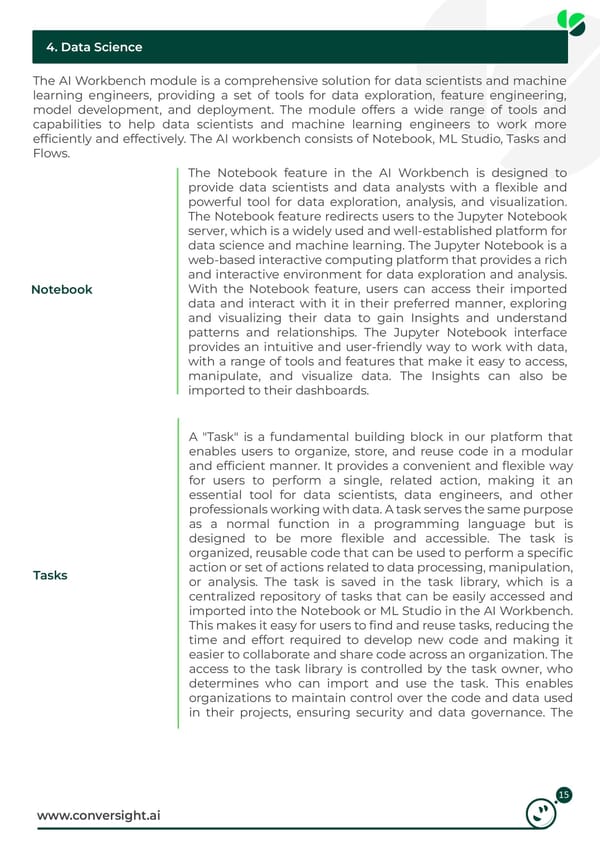4. Data Science The Al Workbench module is a comprehensive solution for data scientists and machine learning engineers, providing a set of tools for data exploration, feature engineering, model development, and deployment. The module offers a wide range of tools and capabilities to help data scientists and machine learning engineers to work more efficiently and effectively. The Al workbench consists of Notebook, ML Studio, Tasks and Flows. Notebook Tasks www.conversight.ai The Notebook feature in the Al Workbench is designed to provide data scientists and data analysts with a flexible and powerful tool for data exploration, analysis, and visualization. The Notebook feature redirects users to the Jupyter Notebook server, which is a widely used and well-established platform for data science and machine learning. The Jupyter Notebook is a web-based interactive computing platform that provides a rich and interactive environment for data exploration and analysis. With the Notebook feature, users can access their imported data and interact with it in their preferred manner, exploring and visualizing their data to gain Insights and understand patterns and relationships. The Jupyter Notebook interface provides an intuitive and user-friendly way to work with data, with a range of tools and features that make it easy to access, manipulate, and visualize data. The Insights can also be imported to their dashboards. A "Task" is a fundamental building block in our platform that enables users to organize, store, and reuse code in a modular and efficient manner. It provides a convenient and flexible way for users to perform a single, related action, making it an essential tool for data scientists, data engineers, and other professionals working with data. A task serves the same purpose as a normal function in a programming language but is designed to be more flexible and accessible. The task is organized, reusable code that can be used to perform a specific action or set of actions related to data processing, manipulation, or analysis. The task is saved in the task library, which is a centralized repository of tasks that can be easily accessed and imported into the Notebook or ML Studio in the Al Workbench. This makes it easy for users to find and reuse tasks, reducing the time and effort required to develop new code and making it easier to collaborate and share code across an organization. The access to the task library is controlled by the task owner, who determines who can import and use the task. This enables organizations to maintain control over the code and data used in their projects, ensuring security and data governance. The
 ConverSight Demystified 1 Page 15 Page 17
ConverSight Demystified 1 Page 15 Page 17